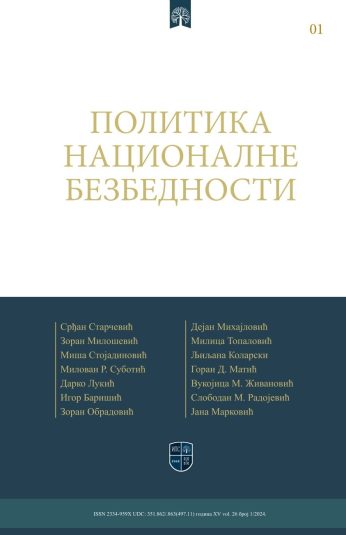Main topic
ARICLES AND STUDIES
INDUSTRIAL ESPIONAGE IN CASE OF CHINA AND USА
Abstract
Industrial espionage, especially in the form of intellectual property theft, generates billions of dollars profit, and thereby its importance in the modern world is increasing. The scandal regarding the company Huawei has showed the complexity of the issue. The company concerned has become a “stumbling block“ between the two superpowers, given the numerous accusations that are coming from the US side that Huawei, in general sense, engaged in industrial espionage on behalf of the Chinese government. It was found that the Chinese industrial espionage related to the alleged theft of technology for fighter of the latest generation F-35, corporate secrets of many companies, such as Motorola, Ford, General Motors, DuPont, well-known US companies in the field of agriculture, and in the field of satellite program, as well as theft of intellectual property with the help of so-called “sleepers’’ in form of Chinese students in the United States. It turned out that industrial espionage takes many forms and that the methodology of intelligence agencies is developing day by day. A particularly dangerous form of industrial espionage represents the theft of intellectual property with the help of modern information and communication technologies. Numerous detected activities in the field of industrial espionage shows that no superpowers does not shy away from committing acts of industrial espionage, regardless of whether the objective of the activities has political, defense or economic character. Although in this paper emphasis is placed on industrial espionage conducted by China against the US, it does not mean that from the opposite direction has similar attacks. Therefore, defense against industrial espionage is very complex issue that requires the involvement of the entire security apparatus of the affected country. We should not neglect the fact that the security apparatus of modern states, often, burdened with other challenges, such as terrorism, organized crime, corruption which, however, imposes a dilemma whether existing resources (personnel and material-technical) are sufficient to fight against industrial espionage. It is necessary that the potential victims of industrial espionage pay greater attention to the protection of its own research and trade secrets, as well as to take appropriate measures in the field of information security. It is necessary to increase the counter-intelligence protection, but also to develop effective systems of defense against cyber attacks and disclosure of business secrets. Industrial espionage (particularly in light of the scandal around the company Huawei) will be a serious political problem in the relations between China and the US, which may lead to further escalation of the conflict between these states in the future.
References
- Androulidakis Iosif, and Emmanouil Fragkiskos-Kioupakis. 2016. Industrial Espionage and Technical Surveillance Counter Measurers, New York: Springer.
- B92. 2019. „Alarm u Vašingtonu: „Kina nam je ukrala tehnologiju za F-35“. 28. avgust 2019. https://www.b92.net/biz/vesti/svet.php?yyyy=2019&mm=08&dd=28&nav_id=1583590
- Бечка конвенција о дипломатским односима [БКДО], Службени лист СФРЈ-додатак, бр. 2/64).
- Бошковић, Мило. 2017. Лексикон безбедности, Београд-Нови Сад: Службени гласник.
- Кривични законик Републике Србије, Службени гласник Републике Србије, бр. 85/2005, 88/2005 – испр., 107/2005 – испр., 72/2009, 111/2009, 121/2012, 104/2013, 108/2014, 94/2016 и 35/2019.
- Marković, Marko. 2019. „Amerika je zabranila Huawei: Kreće bitka za digitalno nadziranje sveta“. Startit. 17. maj 2019. https://startit.rs/amerika-je-zabranila-huawei-krece-bitka-za-digitalno-nadziranje-sveta/.
- Mondo Portal. 2019s. „SAD tužile Huawei za prevare, špijunažu, krađu patenata“. 28. januar 2019. https://mondo.rs/MobIT/Tech-Vesti/a1162564/SAD-Huawei-tuzba-SAD-tuzile-Huawei-SAD-tuzi-Huawei-SAD-tuzba-Huawei-Kina.html.
- Mondo. 2019n. „Najveća industrijska špijunaža ikada!“ 11. april 2019. https://mondo.rs/Info/Svet/a1178973/Industrijska-spijunaza-kineski-radnici-ukrali-tajne-ASML-a.html.
- Mujanović, Erol. 2012. „Industrijska špijunaža: krađe u milionima“. Aljazeera Balkans. 14. maj 2012. http://balkans.aljazeera.net/vijesti/industrijska-spijunaza-krade-u-milionima.
- O’Malley, Brendan. 2018. „White House discussed unilateral ban on Chinese students“, University World News. 04 October 2018. https://www.universityworldnews.com/post.php?story=20181004180117952.
- Petković, Todor. 2009. Poslovna špijunaža i ekonomsko ratovanje. Novi Sad: Protexi Group System.
- President of the United States. 2020. Executive Order on Securing the Information and Communications Technology and Services Supply Chain, May 15, 2019, https://www.whitehouse.gov/presidential-actions/executive-order-securing-information-communications-technology-services-supply-chain/ , last accessed 31 March 2020.
- Север, Александар. 2017. Историја КГБ. Београд: Логос.
- Slobodna Evropa. 2019. „Slučaj Huawei kao triler o aferama, špijunaži i politici“. 31 januar 2019. https://www.slobodnaevropa.org/a/slu%c4%8daj-huawei-kao-triler-o-aferama-%c5%a1pijuna%c5%bei-i-politici/29742427.html.
- Стајић, Љубомир, и Горан Милошевић. 2017. „Финансијска делатност државе као фактор економске безбедности-осврт на Републику Србију.“ Српска политичка мисао 55(1): 175-195.
- Тепавац, Дејан. 2019. „Шпијунажа као облик угрожавања пословних информација.“, Војно дело 71(3): 163-173.
- Уредба о ратификацији Париске конвенције за заштиту индустријске својине од 20. марта 1883. године, ревидирана у Брислу 14. децембра 1900. године, у Вашингтону 2. јуна 1911. године, у Хагу 6. новембра 1925. године, у Лондону 2. јуна 1934. године, у Лисабону 31. октобра 1958. године и у Стокхолму 14. јула 1967. године [УПКЗИС], Сл. лист СФРЈ – Међународни уговори и други споразуми-бр. 5/74 и Сл. лист СФРЈ – Међународни уговори, бр. 7/86 – др. уредба).
- Цветићанин, Невен, и Милан Благојевић. 2019. „Унутрашњи конфликти и спољна политика САД између интервенционизма и изолационизма“, Српска политичка мисао 65(3): 43-62.
- Čavić, Marko. 2019. „Zašto su se SAD „okomile“ na Huawei?“. Mondo. 20. maj 2019. https://mondo.rs/MobIT/Tech-Vesti/a1187590/Huawei-i-SAD-sta-je-problem-optuzbe-za-spijunazu.html.

